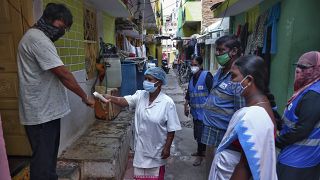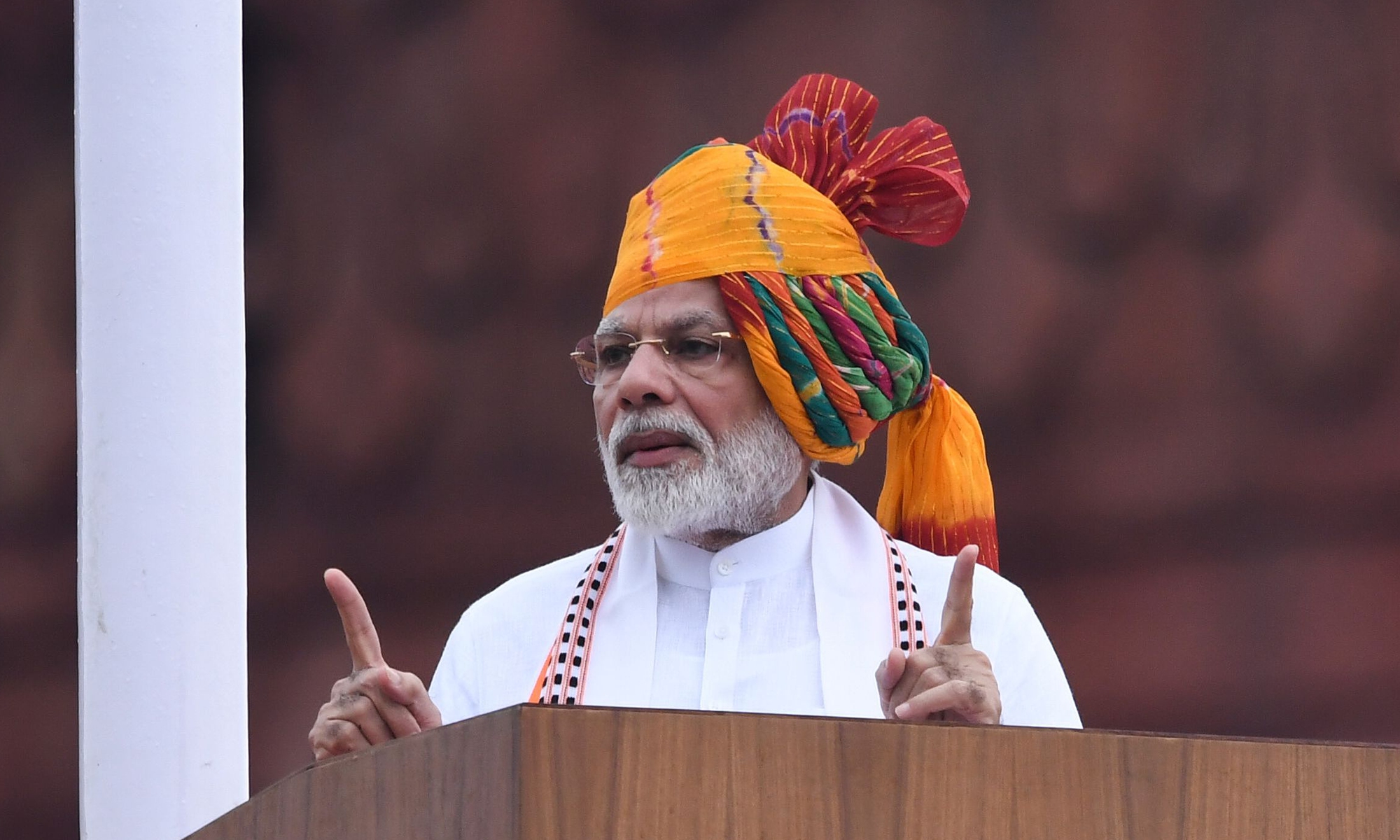A patient suffering from the coronavirus disease (COVID-19) receives treatment inside the emergency ward at Holy Family hospital in New Delhi, India, April 29, 2021. REUTERS/Danish Siddiqui
India COVID: 30,709,557 Cases and 405,057 Deaths ...
India's COVID-19 cases surpass 21 million amid oxygen ...
India COVID cases top 20 million, halting cricket, prompting lockdown call
https://www.reuters.com/world/asia-pacific/indias-tally-coronavirus-infections-crosses-20-million-2021-05-04/
https://www.reuters.com/world/india/indias-coronavirus-infections-cross-18-million-2021-04-29/
Govt denies reports of problems with its vaccine campaign
BENGALURU: India’s total Covid-19 cases passed 18 million after another world record daily infection, as the government rejected reports of problems with its vaccine campaign.
India reported 379,257 new Covid-19 cases and 3,645 new deaths yesterday, according to health ministry data. It was the highest number of deaths reported in a single day in India since the start of the pandemic.
India’s best hope to curb its second deadly wave of Covid-19 was to vaccinate its vast population, said experts, and on Wednesday it opened registrations for everyone above the age of 18 to be given jabs from tomorrow.
But the country, which is one of the world’s biggest producers of vaccines, does not have the stocks for the estimated 600 million people who will be eligible.
Many who tried to sign up said they failed, complaining on social media that they could not get a slot or they simply could not get online to register as the website repeatedly crashed.
“Statistics indicate that far from crashing or performing slowly, the system is performing without any glitches,” the government said in a statement on Wednesday.
The government said more than eight million people had registered for the vaccinations, but it was not immediately clear how many had got slots.
About 9% of India’s population have received one dose since the vaccination campaign began in January with healthworkers and then the elderly.
The second wave of infections has overwhelmed hospitals and crematoriums and prompted an increasingly urgent response from allies overseas sending equipment.
“India’s outbreak is a humanitarian crisis,” US Democratic Senator Elizabeth Warren said on Twitter.
“I’m leading a letter to @moderna_tx, @pfizer, and @jnjnews to find out what steps they’re taking to expand global access to their vaccines to save lives and prevent variants from spreading around the world,” she said.
Two planes from Russia, carrying 20 oxygen concentrators, 75 ventilators, 150 bedside monitors, and medicines totalling 22 metric tonnes, arrived in the capital Delhi yesterday.
Delhi is reporting one death from Covid-19 every four minutes and ambulances have been taking the bodies of Covid-19 victims to makeshift crematorium facilities in parks and parking lots, where bodies burned on rows and rows of funeral pyres.
The US State Department issued a travel advisory warning on Wednesday against travel to India because of the pandemic and approved the voluntary departure of family members of US government employees in India.
A country of nearly 1.4 billion people, India thought the worst was over when cases ebbed in September.
But mass public gatherings such as political rallies and religious events that were allowed to continue, and relaxed attitudes on the risks fed by leaders touting victory over the virus led to what now has become a major humanitarian crisis, health experts say.
New variants of the virus have also partly led the surge.
Amid the crisis, voting for the eighth and final phase of the West Bengal state elections began yesterday, even as the devastating surge of infections continues to barrel across the country with a ferocious speed, filling crematoriums and graveyards.
More than eight million people are expected to vote in at least 11,860 polling stations across the state. A commission said distancing measures would be in place.
Prime Minister Narendra Modi and his Bharatiya Janata Party have faced criticism over the last few weeks for holding huge election rallies in the state, which health experts suggest might have driven the surge there too.
Other political parties also participated in rallies.
The state recorded more than 17,000 cases in the last 24 hours – its highest spike since the pandemic began. — Agencies
Adham: Learn from India's crisis
Space issue: A file photo of Serdang Hospital, which is now at 80% capacity.
PETALING JAYA: Malaysians must take the rise in Covid-19 cases seriously to avoid a similar crisis as the one unfolding in India, says Health Minister Datuk Seri Dr Adham Baba.
His call comes as certain states and private hospitals are eportedly running out capacity to house and treat Covid-19 patients, although the overall occupancy rates of hospitals in the country as a whole was still at just over half.
“In January, (India) said that it looked like it was nearing the end of the pandemic, so people gathered in crowds, went here and there, and as a result, it is facing a storm.
“We must learn from them, especially with the existence of a new Covid-19 variant here, we feel that every Malaysian must be more careful and evaluate how the situation in India has worsened.
“If there is no need to be out, gather or have non-important meetings, then it is better to avoid doing so at this time because there are so many sporadic cases happening in the community, ” said Dr Adham when contacted yesterday.
Malaysia has been logging over 3,000 new infections daily over the past few days.
This has led to an occupancy rate of 54% of beds at the 72 Covid-19 public hospitals nationwide.
However, in states with high case numbers like Kelantan, Sarawak, Selangor and Kuala Lumpur, hospitals are either at full or above 80% capacity.
“In Selangor, Hospital Sungai Buloh, Hospital Tengku Ampuan Rahimah Klang and Hospital Serdang are at 80% capacity and it is something we are worried about.
“In Kuala Lumpur, Universiti Malaya Medical Centre has also reached 80% capacity.
“Johor is also worrying as the Permai Hospital Sports Complex is at 80% capacity and so is Hospital Sultanah Nora Ismail, where 61 beds out of 78 are filled, ” he said.
He dded that the government decided to extend the interstate travel ban as there were many clusters and sporadic cases resulting from such movements.
In states with a high number of Covid-19 cases, Dr Adham said the Ministry is coping by adding the capacity for low-risk quarantine and treatment centres (PKRCs), to which Level 1,2 and 3 patients are diverted, while Level 4 and 5 patients or more severe cases are sent to hospitals.
In Kelantan, the number of Covid-19 beds in Hospital Tumpat had to be increased from 84 to 87, while Hospital Universiti Sains Malaysia is full and Hospital Machang has filled 21 of its 24 beds.
In Sarawak, Hospital Bintulu increased the number of Covid-19 beds from 102 to 147 while in Kapit and Sarikei, hospitals were already at capacity.
However, there were also hospitals with zero or below 50% Covid-19 bed occupancy, such as in Sabah, he said.
“Hospital beds are not nearly or at capacity in every state, but only in states with a high number of cases.
“Hospitals are only for Level 4 and 5 patients but so far it is still within control, ” he added.
Meanwhile for the PKRCs, out of 23,366 beds nationwide, only 43% were filled as at yesterday.
“We are also planning to add 600 more beds at the PKRC in Sungai Buloh, ” said Dr Adham.
Meanwhile, the Malaysia Agro Exposition Park Serdang (MAEPS) has 9,000 beds and can accommodate patients from nearby states like Perak, Melaka and Negri Sembilan.
Level 1 patients or those who were asymptomatic and suitable for home quarantine were already allowed to do so by the Covid-19 Assessment Centre (CAC).
“This is under strict monitoring by the district health office and only if their situation is found to be suitable, otherwise, we will take them to the PKRC, ” said Dr Adham.
Public hospitals have also been outsourcing certain non-Covid-19 patients with light medical issues or elective cases to private hospitals to free up beds in public facilities, he added.
Association of Private Hospitals Malaysia president Datuk Dr Kuljit Singh said private hospitals have reached their capacity for Covid-19 patients.
Dr Kuljit had asked the Ministry to decant non-Covid-19 patients to their hospitals in order to give public hospitals space to handle Covid-19 cases.
On Jan 11, during the peak of the previous surge in infections, the Emergency Ordinance was implemented, allowing the government to take over private healthcare resources.
Health director-general Tan Sri Dr Noor Hisham Abdullah said the Ministry will continue to refer non-Covid-19 cases to private hospitals to free up beds in public facilities.
“We have sent more than 3,000 cases with 48 non-Covid-19 illnesses to private hospitals to create more beds to treat Covid-19 patients.
“When cases are increasing, we will first stop elective surgery to increase the beds but continue emergency and non-emergency cases.
“We will certainly refer non-Covid-19 cases to private hospitals like we did before, ” he said.
Dr Kuljit said private hospitals had provided beds and expertise based on their individual capacity and capability.
However, due to the spike in Covid-19 cases over the last 14 days, all beds designated for the disease in private hospitals are occupied, including isolated intensive care unit (ICU) beds.
“Most private hospitals are not able to accept any more Covid-19 patients, particularly in the Klang Valley.
“Private hospitals are constrained on the number of beds and ICU facilities that can accommodate Covid-19 patients as well as the availability of specialists and nurses, ” he said in a statement yesterday.
Dr Kuljit added that even beds in private facilities in the Klang Valley and Johor were filling up fast.
“The biggest fear would be if we face a healthcare shutdown because of non-availability of beds and oxygen treatment, ” he said.
Related








No comments:
Post a Comment